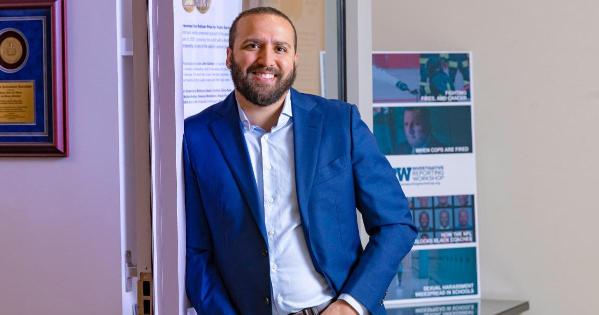Award-Winning Journalist Wesley Lowery Joins American University School of Communication

Wesley Lowery, a Pulitzer Prize-winning reporter and best-selling author, widely regarded as one of the nation’s leading journalists covering issues of law enforcement, race and justice, has joined American University. Lowery, who starts July 1, will be an associate professor of investigative journalism, teaching courses in AU’s School of Communication, and executive editor at the Investigative Reporting Workshop, the nonprofit, editorially independent newsroom based in the school.
“Wesley Lowery is one of the most consequential journalism innovators and educators of our time. His work follows a long tradition of groundbreaking social justice journalism,” said Leena Jayaswal, interim dean of AU SOC. “His investigations have reshaped practices in newsrooms across the nation and influenced national conversations on the Black Lives Matter movement, civil rights, and race relations. We’re delighted to welcome Professor Lowery to the School of Communication and the Investigative Reporting Workshop.”
Founded in 2008 by legendary journalist and nonprofit news pioneer Charles Lewis, IRW holds the powerful accountable through original, data-driven investigative reporting produced by experienced journalists working with the next generation of reporters. IRW partners with newsrooms, including The Washington Post, has developed free reporting tools, and trains early career journalists.
“It’s an honor to lead the Investigative Reporting Workshop into its next chapter,” Lowery said. “For years IRW has been partnering top-flight student journalists with professional newsrooms – partnerships that have aided the most important work of my career. I’m excited to expand upon this mission, working with more students, more newsrooms and more professional journalists to ensure that the workshop remains the country’s premiere training ground for investigative journalism.”
As a national correspondent for The Washington Post, in 2015, Lowery pitched and helped lead Fatal Force, an unprecedented real-time database to track annual fatal shootings by American police officers. The database, which remains the most reliable public data on police shootings, won the Pulitzer Prize, a Peabody Award and George Polk Award and was named one of the decade’s top 10 works of journalism. His 2018 project Murder With Impunity, with Kimbriell Kelly, Ted Mellnik and Steven Rich, a look into police failure to solve homicides, was a Pulitzer Prize finalist. Student journalists from IRW and a graduate practicum inside The Washington Post contributed to gathering and reporting on the data that underpins each of these major investigations.
Lowery’s first award-winning book, They Can’t Kill Us All: Ferguson, Baltimore and a New Era in America’s Racial Justice Movement, was a New York Times bestseller. His new book, American Whitelash: A Changing Nation and the Cost of Progress, explores the rise of white supremacy in the wake of President Barack Obama’s election and the subsequent election of President Donald Trump.
Lowery’s writing and reporting has appeared in The New York Times, Los Angeles Times, The Atlantic, and The Wall Street Journal, among other publications. In his 2020-2022 tenure as an on-air correspondent for 60 Minutes+, the streaming version of CBS News’ iconic newsmagazine, Lowery reported from police brutality protests in Minneapolis and Kenosha, told the story of three Baltimore men exonerated after decades incarcerated, and investigated the National Football League’s use of racial distinctions in concussion payouts.
Lowery will be the second executive editor at IRW after Lewis, a MacArthur fellow, retired from the SOC faculty and IRW. Lewis also founded and ran the Center for Public Integrity and the International Consortium of Investigative Journalists. He also is a founding member of the Institute for Nonprofit News, which now has more than 400 members.
"I'm thrilled that Wesley Lowery will bring his journalistic chops, his new ideas, and his energy to the Investigative Reporting Workshop," Lewis said. "Guiding the next generation of reporters and providing them the tools to succeed is crucial as they seek to investigate the many challenges in the nation and hold those in power accountable."
IRW and SOC are committed to providing experiential learning opportunities to propel students into post-graduate careers. Approximately two dozen students from AU and colleges nationwide annually work as paid researchers or reporters under the supervision of experienced editors and the workshop’s reporting partners to gain hands-on journalistic training and opportunities to learn from industry experts.
Through its Washington Post Practicum, AU graduate students work with the Post’s investigative team under Pulitzer Prize-winning SOC faculty member and IRW editor John Sullivan. Students in the practicum have worked on teams that have won the Pulitzer Prize, including in 2022, when eight students were part of the Post team that won for coverage of the January 6 attack on the U.S. Capitol.
